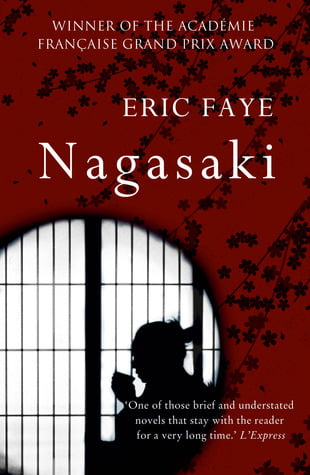Getting into new French fiction: Nagasaki by Éric Faye
 An understated and haunting novella from prolific French fiction novelist Éric Faye, recently published in English by Gallic Books.
An understated and haunting novella from prolific French fiction novelist Éric Faye, recently published in English by Gallic Books.
What do you do if you notice food going missing from your fridge… and yet you live alone?
Being a scientist by trade, Shimura-san, the book’s middle-aged protagonist, applies a careful scientific method to solving the mystery: he sets up webcams to monitor his house while he’s at work.
But is he prepared for what they will show him?
The strange, slight book that won the 2010 Grand Prix du Roman de L’Académie Française
As this fantastic Spectator review identified, it’s best not to give too much of an introduction to the plot of this French fiction novella -Nagasaki. Better to let it unfold, unhurriedly, “like those Japanese paper pellets that, dropped into water, expand into fragile, delicate beauty that touches the heart.”1

You can spend your lunch hour “angling for ‘friends’ on Facebook”2 but all the while, someone could be sharing your living space unbeknown to you.
Shimura, at work and in his home life, is surrounded by screens – webcams, computers – but they are not portals to any human connection. There is, instead, reciprocal voyeurism: Shimura watches what appears on the webcams, and it watches him in turn – but never the twain shall meet. The gulf cannot be breached.
A chilling indictment of modern life
Then there’s the distant rumble of the economic crisis (the book is set pre-credit crunch) that according to Shimura, “is making everyone feel a little more alone.”3
Disquieting images seep in. Robots are continually mentioned. Shimura himself begins to feel that he doesn’t “have the heart for anything: it had stopped.”4
Shimura’s narration is that of a scientist: pared down, detached, precise. But it can also come across as oddly cold: “Tomorrow’s microbes, toxins and proteins awaited me in that cold antechamber, and the thought of a stranger’s hand taking it from me…repulsed me.”5
The fragile isolation in which Shimura lives is reflected back to him in the webcams, and made alien: he sees his kitchen as a “still life with utensils” with “something of the Herculaneum about it, as if caught out by suffocating gases.”6
I can’t help thinking that Faye’s choice of setting was not coincidental. Why not another Japanese city? The name Nagasaki has massive resonance in the collective Western memory. Although the atomic bombing is mentioned only in passing, I feel like Faye is using the connotations that many readers will attach to the name Nagasaki to deepen another theme explored in this book: guilt.
It’s guilt that Shimura ultimately feels, as he realises that his actions might inadvertently lead to the potential destruction of another.
Have you read the French fiction novella ‘Nagasaki’? What did you think? Leave your opinion in the comment box below!
References1. Lee Langley, ‘Who’s raiding the fridge?’ Spectator, May 3, 2014.
2. Éric Faye, Nagasaki, trans. Emily Boyce (London: Gallic Books), 34.
3. Éric Faye, Nagasaki, 75.
4. Éric Faye, Nagasaki, 69.
5. Éric Faye, Nagasaki, 15.
6. Éric Faye, Nagasaki, 56. Image Credits
1. Eric Faye by Fayeeric1963, via Wikimedia Commons.
2. Nagasaki book cover, via Gallic Books.
3. Nagasaki City view from Hamahira01s3 by 663highland, via Wikimedia Commons.








Intriguing! Sounds like it would make a good movie, peut-être. 🙂
Yes! A bit Hitchcock-esque, too…
This sounds like a great read! Interesting ideas about modern life and isolation despite the illusion of company: this guy has company despite the illusion of solitude! Especially interesting perhaps, as social isolation has, I think, become an increasing issue in Japan.
I also love the idea of fusion between the two cultures – Japan through the French eyes. I will put it on my Book Depository wish list!
Hi Elise, you’ve expressed the paradox that I think Faye so deftly explores. I would like to learn more about contemporary Japanese culture and social issues. There seems to be an affinity between French/Francophile and Japanese culture – see ‘The Elegance of the Hedgehog’ and then read Amélie Nothomb’s ‘Fear and Loathing’ – she might disagree with me…!
This sounds like a great read, will definitely add this to my rather long summer reading list!
Good stuff Selina! Oh tell me about it, my ‘summer reading list’ usually spills over to Autumn and beyond…
Great point Elise about living with social isolation in modern life. I imagine it would be especially distressing to someone from a collectivist culture such as Japan. This book also sounds like an interesting narrative on voyeurism (via multiple digital devices) – perhaps this is on the rise too with our modern lifestyles? Perhaps this can make us feel even more alone – by pointing out that there is no one in the room with us: the only people we can see are on screens, unable to interact.
Many thanks for your insightful comment, Alex. Voyeurism is definitely a huge theme here and it’s a flip side of what is probably one of the best fictional explorations of loneliness I’ve ever read.